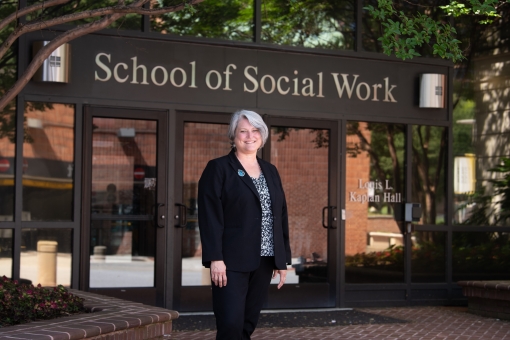As the University of Maryland School of Social Work (UMSSW) celebrates its 60th anniversary this year, it certainly had a 59th to remember thanks to accomplishments made despite the COVID-19 pandemic.

University of Maryland School of Social Work Dean Judy L. Postmus, PhD, ACSW
“I am more than impressed with the breadth and depth of the work done by our faculty and staff to accomplish our mission to develop practitioners, leaders, and scholars to advance the well-being of populations and communities and promote racial, economic, and social justice,” UMSSW Dean Judy L. Postmus, PhD, ACSW, said during the 2021 School of Social Work State of the School address on Sept. 29.
(Watch the entire presentation above.)
Advancing the school’s diversity, equity, and inclusion (DEI) efforts across all facets was a major focus of the dean’s address.
The school created a new Office for Diversity, Equity, and Inclusion led by assistant dean for DEI Neijma Celestine-Donnor, MSW, and DEI coordinator Julia Scott. The office has been very active since its inception. The DEI office expanded by launching affinity groups for students, staff, and faculty, in areas of Black, Indigenous, and People of Color (BIPOC), LGBTQIA, disability, white accountability, and others. The office also piloted intergroup dialogue meetings at The Institute for Innovation and Implementation for 20 faculty and staff, and launched a DEI webpage.
The office also helped support the launch of a prerequisite course for all incoming MSW students, “A Brief History of Oppression and Resistance,” for which the faculty and staff who created the course won the University of Maryland, Baltimore(UMB) President’s Core Value Award for Diversity.
Another addition to the school this past year was a Center for Excellence on LGBTQ+ Behavioral Health Equity by The Institute for Innovation and Implementation. The center is a partnership with Affirmative Research and Judge Baker Children’s Center, Harvard Medical School.
During its first nine months, the center created six e-learning modules and three resource documents, including an animation on sexual orientation, gender identity, and gender expression (SOGIE) terminology.
The center is led by Institute deputy director and clinical associate professor Marlene Matarese, PhD, MSW, as principal investigator and Angela Weeks, DBA, MPA, as project director. It is funded through a five-year, $3.5 million grant from the U.S. Department of Health and Human Services’ Substance Abuse and Mental Health Services Administration (SAMSHA). The intent of the project is to provide health care practitioners with best and evidence-based practices and implementation strategies that directly reduce disparities among the LGBTQ+ population across mental health and substance use disorder treatment systems.
“Kudos to this new center,” Postmus said.
The Institute also initiated a multiyear partnership with the Indigo Cultural Center, which provides ongoing equity training and coaching for all consultation programs to address racial inequity in early childhood, Postmus said.
The Institute launched a National Quality Improvement Center for Family-Centered Reunification.
“The intent of that project is to work with five to seven different public child welfare sites around the country to identify, assess, and implement promising and evidence-based practices that address the individual and collective needs of families with children in foster care,” Postmus said.
In other moves, the school revamped the Office of Academic Affairs led by senior associate dean Amanda Lehning, PhD, MSW, that includes Student Affairs, Field Education, Title IV-E, Instructional Design E-Learning and Assessments (IDEA), and the Universities at Shady Grove (USG), and created a new Office of Admissions & Enrollment in Academic Affairs led by associate dean Danielle White, MBA, MS.
“The intent of doing this reorganization was to provide better communication between departments, stronger collaboration to support innovative program options,” Postmus said. “They were creating new videos to provide information on curriculum and degree options, and they updated the electronic field notebook to be able to analyze data and produce updates in our field education.”
Other highlights from this past year include:
- 545 students received almost $2.5 million in non-loan assistance such as scholarships and stipends.
- 763 MSW students were placed at 351 sites across the state, with 27 new agencies added for field placements at USG alone.
- Received over $36 million in sponsored projects with an increase in faculty applying for large grants from the National Institutes of Health and National Science Foundation.
- Team responded to 879 requests for service, which is a 39 percent jump from the previous year. “They were busy providing support to our faculty who are pivoting to online work,” Postmus said.
- Students were authors or co-authors on more than 26 peer-reviewed publications and 28 peer-reviewed presentations at conferences.
- B’more For Health Babies announced the Upton/Druid Heights infant mortality rate dropped by 75 percent to 3.8 per 1,000 live births. It is the lowest urban neighborhood rate in the country and third lowest overall in the United States.
- The Positive Schools Center distributed over 35,000 pounds of food, leveraged almost $170,000 in donated funds, and hosted two vaccination clinics. The center was awarded a UMB Catalyst for Excellence Award in 2020.
- 100 percent of families remain unified with no out-of-home placement due to child abuse in the Family Connections.
“I am honored to lead the school and be a part of this amazing community,” said Postmus, who took the helm as dean in July 2020.


